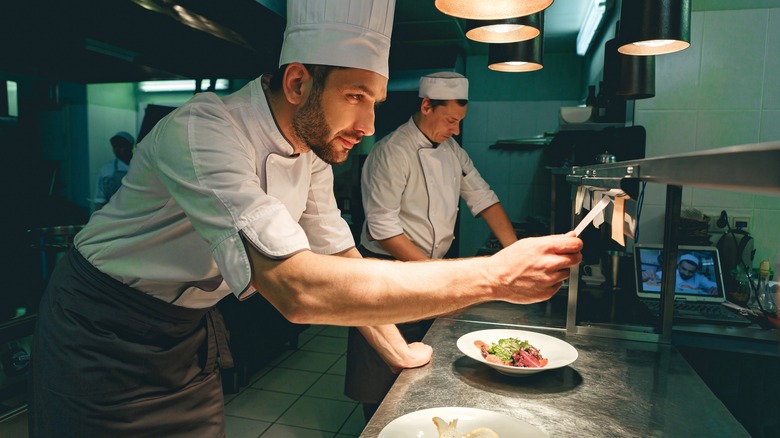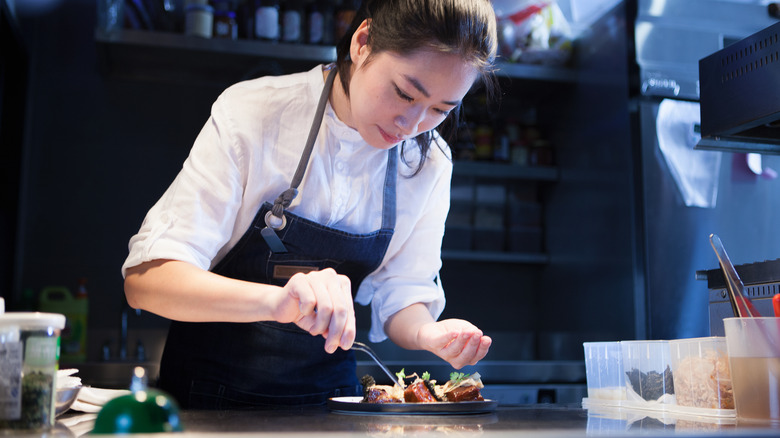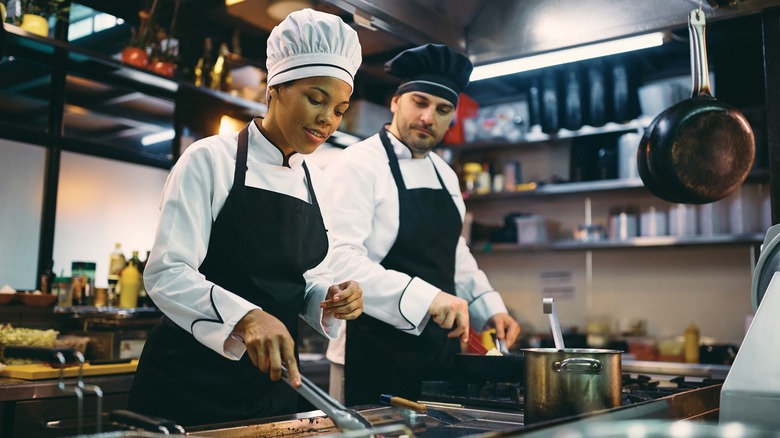What Is A CDC, And What Do They Do In Restaurant Kitchens?
Restaurant operations are having a moment in public perception; in addition to the myriad food shows on TV, FX's "The Bear" delves into topics like the real ins and outs of restaurant competition and how modifications are really a big deal in fine dining. And if you watch these shows, one of the terms you might've heard is someone referred to as a "CDC." This doesn't mean they're affiliated with the Centers for Disease Control; the CDC is simply an acronym for the far more wordy chef de cuisine. But what does a chef de cuisine do, and how are they different from other roles like sous and executive chefs?
Simply put, the chef de cuisine is responsible for the day-to-day operations of a restaurant kitchen. When the executive chef — who may or may not own and operate multiple restaurants — isn't present, the chef de cuisine is the big boss in charge. They're known for being hands-on and working right on the line with everyone else. This also explains the other term sometimes used instead of chef de cuisine: Head chef.
Chefs de cuisine are more involved in the day-to-day than executive chefs
People often have a lot of misconceptions about what an executive chef actually does. In many ways, they have the final say about what goes on and are often restaurant owners; executive chefs are supervisors more than anything and don't do much of the cooking. A chef de cuisine, by contrast, absolutely does a ton of cooking in addition to being in charge whenever the executive chef isn't there. They have to be skilled and well-versed enough to work any station at any time, depending on what's needed.
Their responsibilities don't end there. In addition to overseeing a kitchen's inner workings, chefs de cuisine also have plenty of bureaucratic aspects to their jobs. They're the ones who work with food suppliers, make sure all equipment is up to spec, deal with hiring and firing lower-ranking kitchen staff, and have a large hand in menu planning alongside not just the executive chef but also the sous and pastry chefs. Basically, if something goes wrong in the kitchen as part of day-to-day work, the buck stops with the chef de cuisine.
A chef de cuisine outranks a sous chef
You might wonder how chefs de cuisine differ from sous chefs, and the answer is pretty simple. If the chef de cuisine can be considered the executive chef's right-hand man, the same relationship can be applied to the sous chef as it pertains to the chef de cuisine. Chefs de cuisine are the top position in the hierarchical brigade system created by Auguste Escoffier, but they also have to rely heavily on sous chefs for everything they can't do. While chefs de cuisine generally work extremely long hours, including nights and weekends, they can't be present 100% of the time. If neither the executive chef nor the chef de cuisine is present, the sous chef will typically be in charge.
Chefs de cuisine can't simply be good at one thing in the kitchen, nor can they be good only at the cooking aspects of the job if they want to be successful. A chef de cuisine needs to deal with administrative and clerical work, needs to have the creativity to come up with menu items, and needs to know how to manage people.


